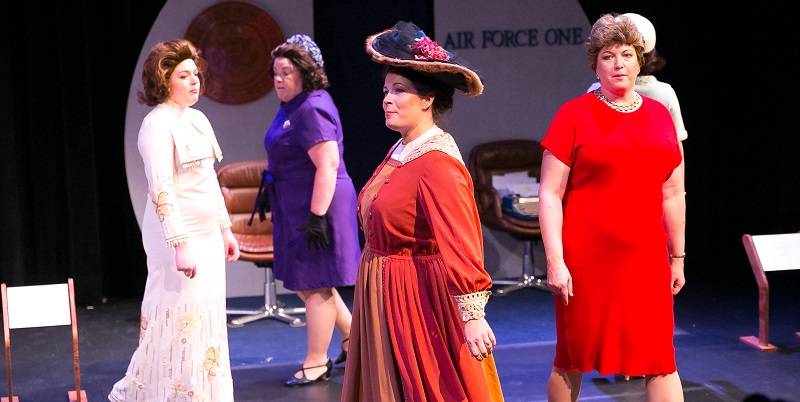When researching or reading, it sounds simple: a sung-through musical featuring four mid-century First Ladies, giving them a chance to express their sides of the stories we know. In reality, First Lady Suite is a complex conglomeration of challenging chords and vocal ranges, even messier emotions and surprisingly few contributions from the Presidents’ wives. An audience member who is open to the experience will find a satisfying evening spent empathizing with the challenges unique to women throughout history, and the performers of Parkland’s Second Stage are well-prepared to guide you through.
“It sure is nice to get away from the desk,” sings Ms. Lincoln (Kari Croop), secretary to President Kennedy, as she picks up a manual typewriter and places it on her lap while settling into a cushy airline chair aboard Air Force One. Not only was that the first of many genuine laughs provoked during my evening spent at First Lady Suite, but it also prompted a heartfelt ache at the reality of a woman’s life, both then and now.
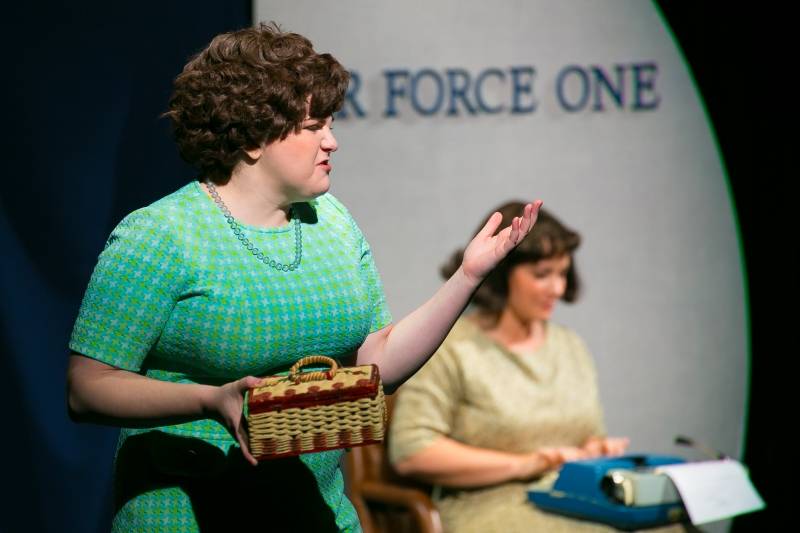
She is genuinely happy, it seems, while her companion, Jackie Kennedy’s aide – Mary Gallagher as played by Stephanie Swearingen – bemoans the demands of the exacting wife. Like this tableau, each laughable moment throughout the play was accompanied by a receding thought about what the laugh meant. Mamie Eisenhower (Nicole Morgan) turned her famous Pink Bed™ into a wrong-colored Tardis, mugging her way through space and time while searching for her husband (Phillip Meadows, who played all the male roles) who was absent on her birthday. Diane Pritchard as Bess Truman hilariously stole her daughter’s spotlight with well-timed physical comedy in the form of fake sneezes. Each laugh had its foil and provoked some 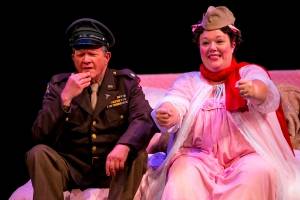 reflection. Christine Mayer as Margaret Truman broke my heart with her facial expressions as she tried to keep herself together enough to finish her song. The nightgown-clad traveler ran into the impressive Tafadzwa Diener as Marian Anderson, who explained why Ike needed to deal with the situation in Little Rock. The play’s content was a precarious balance kept between struggle and relief by the entire cast.
reflection. Christine Mayer as Margaret Truman broke my heart with her facial expressions as she tried to keep herself together enough to finish her song. The nightgown-clad traveler ran into the impressive Tafadzwa Diener as Marian Anderson, who explained why Ike needed to deal with the situation in Little Rock. The play’s content was a precarious balance kept between struggle and relief by the entire cast.
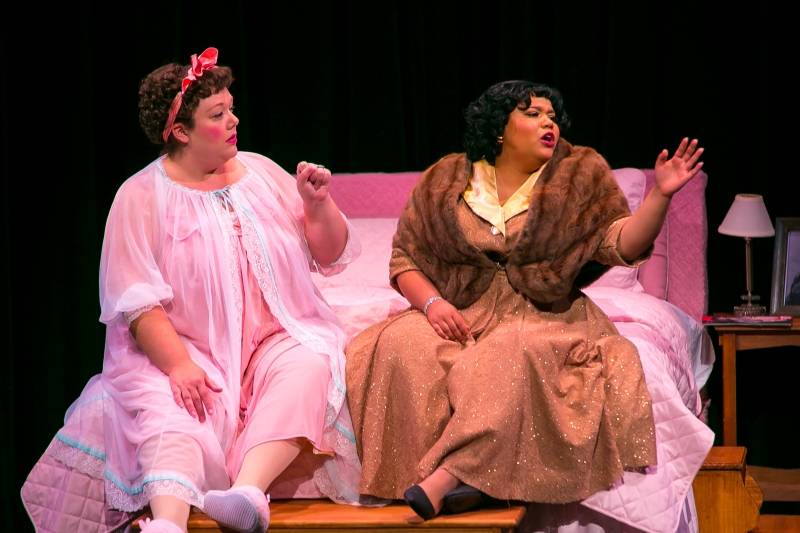
There was one scene, however, where playwright and composer John Michael LaChiusa decided to be relentless with his message. “Eleanor Sleeps Here”, the ultimate vignette of the play, features the complicated and indeterminate relationship between Ms. Roosevelt and journalist Lorena “Hick” Hickok. Malia Andrus unpacked her character’s interior with absolutely no reservations to bring this show to its conclusion. With careful phrasing in play, Andrus’ Hick filled in every gap through her vocal tone and body language. By the end, it doesn’t matter if the two women were friends or lovers, because it’s clear that the depth of the relationship is vital to Hick, and the thought of death is easier than the thought of being replaced. Even without a plane on stage, I was certain she would jump off the wing. It was a powerful way to end the play, and the players were committed and touchingly convincing.
Leaving the theatre, I was not the only audience member whose curiosity about each of these women had been piqued. Luckily, since the lobby is decorated like a museum, many of us were prompted to stop and read the information and look through the photographs to give us a better understanding of the facts and speculation about each historical figure. Even without opinions or agendas, just these basic articles were enough to communicate what the role of women has been throughout time: sacrifice, smile, enact the small amount of power or change that you can.
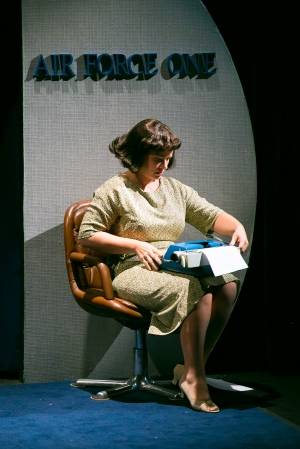 That typewriter moment early in the show perfectly framed most of the play’s themes in one line and action, as the assistant precariously balanced an unwieldy and heavy burden atop her knees kept together demurely, ankles crossed so as not to reveal too much while wearing a couture short skirt; performing a task that requires effort under the best of circumstances made even more difficult by the lack of a steady, flat surface while fighting turbulence; and living up to the expectation that she not only do so cheerfully, but actually express gratitude for the change in scenery.
That typewriter moment early in the show perfectly framed most of the play’s themes in one line and action, as the assistant precariously balanced an unwieldy and heavy burden atop her knees kept together demurely, ankles crossed so as not to reveal too much while wearing a couture short skirt; performing a task that requires effort under the best of circumstances made even more difficult by the lack of a steady, flat surface while fighting turbulence; and living up to the expectation that she not only do so cheerfully, but actually express gratitude for the change in scenery.
Every element of the show was woven together to underscore this message and it was evident from the very first number when each female cast member – dressed to model a dozen specific First Ladies in period garb – cut a path through the stage that was almost as complicated as the harmonies they sang.
This work is a challenging one, and “work” is apt as opposed to “show” or “play”, because the effort required to stage this production is apparent. The costumes created by Andrus are detailed and historically appropriate. Even the accompaniment, solo pianist Kat Downs, was only briefly relieved by Swearingen during the ninety-minute performance. That drove home just how high the expectations are upon women, and how capably those expectations are met. During the closing, their song, their expressions, their posture as they sang of their desire for “flight” made it clear that for too long, women’s wings have been clipped.
First Lady Suite continues to play from October 14th to the 23rd with Friday and Saturday performances at 7:30 p.m. while Sundays have a 3 p.m. matinee. Tickets are $15 for adults, with discounts available, and can be reserved online or by calling 217-351-2528.
All photographs taken by Sam Logan.








